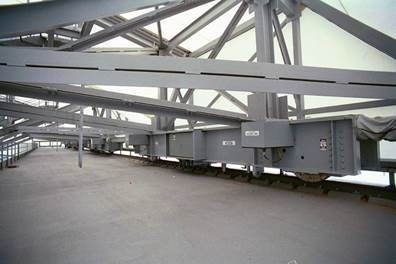Planned Strip arena would have unique feature — a retractable roof

Only a few major league football stadiums and baseball parks in the U.S. have retractable roofs that open and close depending on the weather.
But Jackie Robinson, a former UNLV basketball star building a $690 million arena next to SLS Las Vegas on the Strip, is trying to make sports facility design history by building his arena with a retractable roof.
Robinson’s lead architect, Brett Ewing of the Cuningham Group in Summerlin, said no other arena in the country has a roof that opens and closes.
“We want it to be a feature that people want to see,” Ewing said this month.
Robinson, who says he has lined up the financing for the $1.4 billion All Net Arena and Resort nongaming hotel project, broke ground on the former Wet ’n Wild site Oct. 29.
Still needing a development agreement with Clark County, Robinson hopes to open the arena in early 2017.
Ewing said arenas traditionally are closed because their events do not need grass and an open sky. But the Robinson arena will have a two-panel roof system that opens for events such as boxing matches, rodeos, tennis and concerts under the stars, Ewing said.
Robinson explained why he wants the retractable roof: “It’s Las Vegas, and in Las Vegas people come here for the experience and for something you can’t find anyplace else.”
The arena project is also a catalyst to bring the NBA to Las Vegas. Robinson said NBA executives have told him that after arena construction begins, dialogue about creating an NBA team that would play at the 22,000-seat arena can continue between him and the league. Robinson said his financing also includes money to start an NBA team.
Robinson explained the NBA could move two Western Conference teams, such as the Memphis Grizzlies and New Orleans Pelicans, to the Eastern Conference and launch expansion teams in Seattle and Las Vegas to help improve team travel conditions.
RETRACTABLE ROOF AS A ‘GIMMICK’
New York architect Peter Eisenman, who worked on the retractable-roofed University of Phoenix Stadium, home of the NFL Arizona Cardinals, wondered why an arena in Las Vegas would need a retractable roof.
“I don’t know why they would want to do it,” Eisenman said from his Manhattan office. “I don’t know why you would put a retractable roof on an arena, which has indoor activities like ice hockey or basketball. … It’s a gimmick.”
He noted NFL players at the Cardinals stadium don’t like the roof open because of the uneven sunlight.
But Eisenman said he could understand the strategy of having a retractable roof for the purpose of having something unique to serve the Las Vegas tourist market.
Kevin Kemner, University of Nevada, Las Vegas School of Architecture assistant director, said arena events typically do not need an open roof.
“Retractable roofs are largely used for venues that host activities that one might reasonably find outdoors such as football or baseball. Most arenas house basketball or hockey. Due to environmental concerns (water to temperature), this would not be a desirable solution for an arena,” Kemner said.
Some skeptics of an arena with a retractable roof have said an arena needs a fixed roof to support lighting, audio and visual equipment. But Eisenman said an arena can be designed with a retractable roof and still accommodate that gear.
Kemner put it this way: “Arenas are smaller than stadiums so the engineering wouldn’t be that complicated. It really depends on what activity is intended to be hosted. Something like NFR would be no problem, an NBA game on the other hand would be problematic … It comes down to the perceived benefit. If your arena is hosting events that would benefit by exposure to the climate, then great. If not, it seems like misplaced resources.”
Ewing said the Robinson arena will use the same technology that football and baseball stadiums use — just a smaller version of the technology scaled down to fit the arena’s dimensions.
RETRACTABLE-ROOF EXPERIENCE
Robinson has hired Walter P. Moore, a Dallas engineering consulting company with experience with retractable roof sports venues. The company has worked on retractable roofs of stadiums that house the NFL’s Dallas Cowboys, Houston Texans and Arizona Cardinals and Major League Baseball’s Houston Astros and Miami Marlins.
The arena’s retractable roof would be 150 by 200 feet, Ewing said. By comparison, the retractable roof of AT&T Stadium, the Cowboys’ home stadium in Arlington, Texas, is 256 by 410 feet, he said.
The cost for the arena’s high-tech roof is $60 million, Ewing said. That’s a little less than 10 percent of the $690 million arena cost.
Mashari Nassar, a Walter P. Moore senior principal, said the Robinson arena will use one of three retractable roof systems — traction drive, rack-and-pinion or cable drum drive.
Nassar said as the arena design is finalized, engineers will determine which system is best for the arena. The types of light, sound and video equipment that will have to be supported and the number of times the roof will be opened annually are factors that will help determine the best system for the building, Nassar said.
Ewing will work with Nassar and also HKS Architects of Dallas and Uni-Systems of Minneapolis on the retractable roof.
Nassar and Uni-Systems worked on Marlins Park in Miami, the last retractable roof sports venue to open in North America in 2012.
Contact reporter Alan Snel at asnel@reviewjournal.com or 702-387-5273. Find him on Twitter: @BicycleManSnel